WATCH: Whale freed from a fishing rope around its tail
2017-10-01 22:48
Jeanette Chabalala
Cape Town – A whale was successfully freed on Sunday afternoon after it was anchored to the sea bed with a fishing rope around its tail and a single flotation buoy, the SA Whale Disentanglement Network (SAWDN) said.
SAWDN was alerted by a passing vessel reporting to be 45 nautical off-shore between Knysna and Plettenberg Bay, spokesperson Craig Lambinon said in a statement.
Lambinon said the National Sea Rescue Institute (NSRI) Plettenberg Bay sea rescue craft, accompanied by SAWDN volunteers and its specialised cutting equipment, were launched from Plettenberg Bay at 12:00.
The line around the tail was cut which freed the whale from the anchored entrapment. The floatation buoy was also cut, he said.
"The cutting operation took 20 minutes before the whale was freed from the rope and buoys and the whale swam off confidently and we are confident that the operation has been successful and the whale appears to be healthy," he said.
http://www.news24.com/SouthAfrica/News/ ... l-20171001
Whales
- Lisbeth
- Site Admin
- Posts: 65934
- Joined: Sat May 19, 2012 12:31 pm
- Country: Switzerland
- Location: Lugano
- Contact:
Re: Whales
I wonder for how long a whale can stay under water.....or maybe it was not under water, but only prisoner of the rope 
I suppose that it was a SOUTHERN RIGHT WHALE. Strange that they have not mentioned it
I suppose that it was a SOUTHERN RIGHT WHALE. Strange that they have not mentioned it
"Education is the most powerful weapon which you can use to change the world." Nelson Mandela
The desire for equality must never exceed the demands of knowledge
The desire for equality must never exceed the demands of knowledge
- Richprins
- Committee Member
- Posts: 75402
- Joined: Sat May 19, 2012 3:52 pm
- Location: NELSPRUIT
- Contact:
Re: Whales
Please check Needs Attention pre-booking: https://africawild-forum.com/viewtopic.php?f=322&t=596
- Richprins
- Committee Member
- Posts: 75402
- Joined: Sat May 19, 2012 3:52 pm
- Location: NELSPRUIT
- Contact:
Re: Whales
18m humpback whale carcass towed to Hout Bay harbour
2018-06-25 21:52
Sesona Ngqakamba
An 18m humpback whale carcass has been towed to Hout Bay harbour from Kommetjie in Cape Town.
The adult southern right whale, which is estimated to weigh over 40 tons, was spotted by an eyewitness at around 10:45 on Monday, National Sea Rescue Institute spokesperson Craig Lambinon said.
The witness informed Hout Bay's NSRI duty crew. Lambinon said the carcass was floating 200m off shore at the time.
He added that Kommetjie and Hout Bay NSRI duty crew found that it would wash ashore in the vicinity of the Kommetjie boat slip-way.
"The City of Cape Town (CoCT) marine animal stranding network [was] activated. But as a precautionary measure, NSRI Hout Bay launched the deep sea rescue craft Nadine Gordimer anticipating to reach the scene quickly to attach a towline to hold the whale carcass from washing ashore until a CoCT marine unit could get to the scene," Lambinon said.
He said the NSRI Kommetjie sea rescue craft Il Battello was also launched from NSRI Kommetjie to assist with manoeuvrability around the carcass while a towline was attached.
Lambinon said a towline was then rigged to the carcass and it was towed to Hout Bay successfully.
The NSRI Hout Bay deep sea rescue craft towed the carcass about three knots to the Hout Bay harbour, where the CoCT cleansing department would recover the carcass for disposal.
Lambinon said if the carcass was towed to sea, it would have been a "navigational hazard" to the ships and boats.
"It was considered to tow the carcass out to sea (to allow for natural decomposition at sea) but our fear was that the large carcass and heavy weight may have been a hazard to shipping vessels or fishing vessels at sea," he said.
Lambinon added that the reason why the carcass was towed to Hout Bay Harbour was because it would be easy for the cleansing department to break it up and take it to the disposal site.
"Taking all of this into account the only option that presented as the best option was to tow the carcass to Hout Bay for controlled and easily accessible recovery and disposal," he said.
https://www.news24.com/SouthAfrica/News ... r-20180625
2018-06-25 21:52
Sesona Ngqakamba
An 18m humpback whale carcass has been towed to Hout Bay harbour from Kommetjie in Cape Town.
The adult southern right whale, which is estimated to weigh over 40 tons, was spotted by an eyewitness at around 10:45 on Monday, National Sea Rescue Institute spokesperson Craig Lambinon said.
The witness informed Hout Bay's NSRI duty crew. Lambinon said the carcass was floating 200m off shore at the time.
He added that Kommetjie and Hout Bay NSRI duty crew found that it would wash ashore in the vicinity of the Kommetjie boat slip-way.
"The City of Cape Town (CoCT) marine animal stranding network [was] activated. But as a precautionary measure, NSRI Hout Bay launched the deep sea rescue craft Nadine Gordimer anticipating to reach the scene quickly to attach a towline to hold the whale carcass from washing ashore until a CoCT marine unit could get to the scene," Lambinon said.
He said the NSRI Kommetjie sea rescue craft Il Battello was also launched from NSRI Kommetjie to assist with manoeuvrability around the carcass while a towline was attached.
Lambinon said a towline was then rigged to the carcass and it was towed to Hout Bay successfully.
The NSRI Hout Bay deep sea rescue craft towed the carcass about three knots to the Hout Bay harbour, where the CoCT cleansing department would recover the carcass for disposal.
Lambinon said if the carcass was towed to sea, it would have been a "navigational hazard" to the ships and boats.
"It was considered to tow the carcass out to sea (to allow for natural decomposition at sea) but our fear was that the large carcass and heavy weight may have been a hazard to shipping vessels or fishing vessels at sea," he said.
Lambinon added that the reason why the carcass was towed to Hout Bay Harbour was because it would be easy for the cleansing department to break it up and take it to the disposal site.
"Taking all of this into account the only option that presented as the best option was to tow the carcass to Hout Bay for controlled and easily accessible recovery and disposal," he said.
https://www.news24.com/SouthAfrica/News ... r-20180625
Please check Needs Attention pre-booking: https://africawild-forum.com/viewtopic.php?f=322&t=596
- Lisbeth
- Site Admin
- Posts: 65934
- Joined: Sat May 19, 2012 12:31 pm
- Country: Switzerland
- Location: Lugano
- Contact:
Re: Whales
EcoTravels: Whale season kicks off with massive monitoring project launched on KZN coast
2018-07-09 11:44 - Gabi Zietsman
( Watch the videos)
Universities, conservation organisations and other NGOs are banding together for a 2-month monitoring survey of humpback whales that migrate along the KwaZulu-Natal coastline between the Antarctic and Mozambique.
Kicking off in iSimangaliso Wetland Park, the monitoring project forms part of a 30-year survey that is tracking the population recovery of these giants after their numbers were decimated by the coast's commercial whaling practices between 1908 and 1979.
It was first started by Professor Ken Findlay and Dr Peter Best from Cape Peninsula University of Technology and University of Pretoria, respectively, in 1988. The long-term monitoring will not only highlight the impact whaling and its ban had on the species, but how other factors like climate change, whale watching, pollution, fisheries and oil and gas exploration have affected the whales over the decades.
The data collected will include numbers and pod sizes, density, migration speed and their distance from the shore. This data in turn will also create a measuring stick for the southern ocean's wider ecosystem, which can be used to influence policies around conservation and resource use in the area.
"The recovery of Southern Hemisphere humpback whales from severe whaling pressures last century when some 210 000 animals were whaled, must rate as one of the world's great conservation recoveries," commented Findlay.
"Populations that migrate on the KwaZulu-Natal coast each year were whaled in the Antarctic, on their migration and in their Mozambican breeding grounds. Their current recovery at some 10% per annum is really heartening to see."
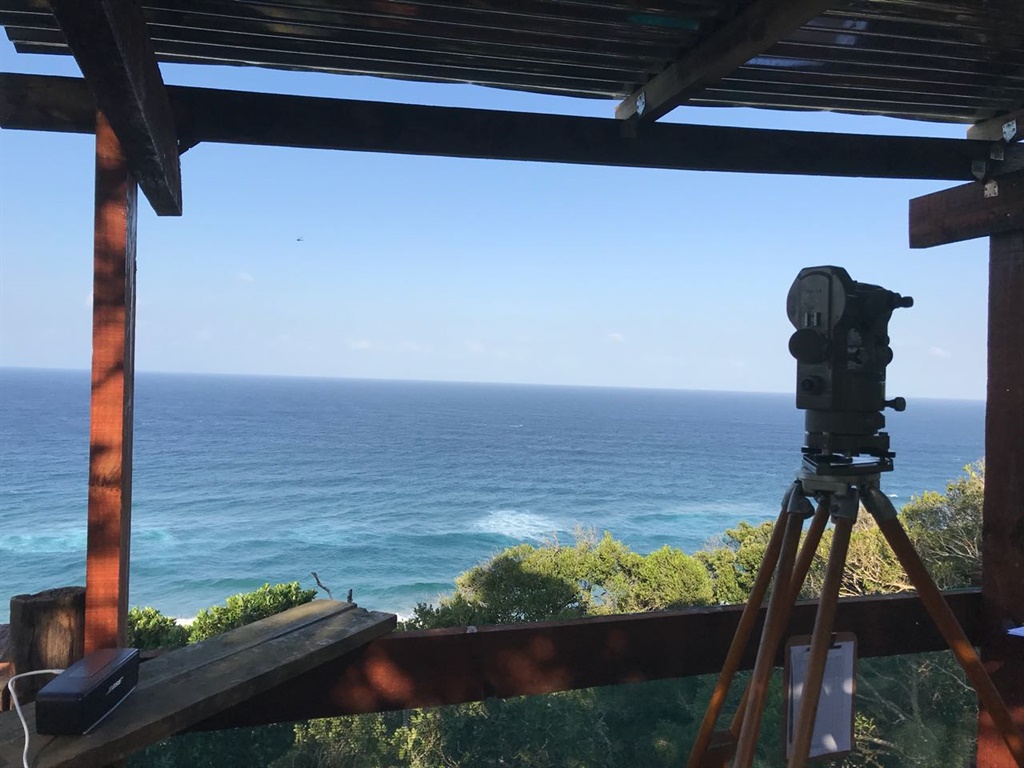
The whale towers afford observers a panoramic ocean view, ideal for spotting whales. (Photo: Love Africa Marketing)
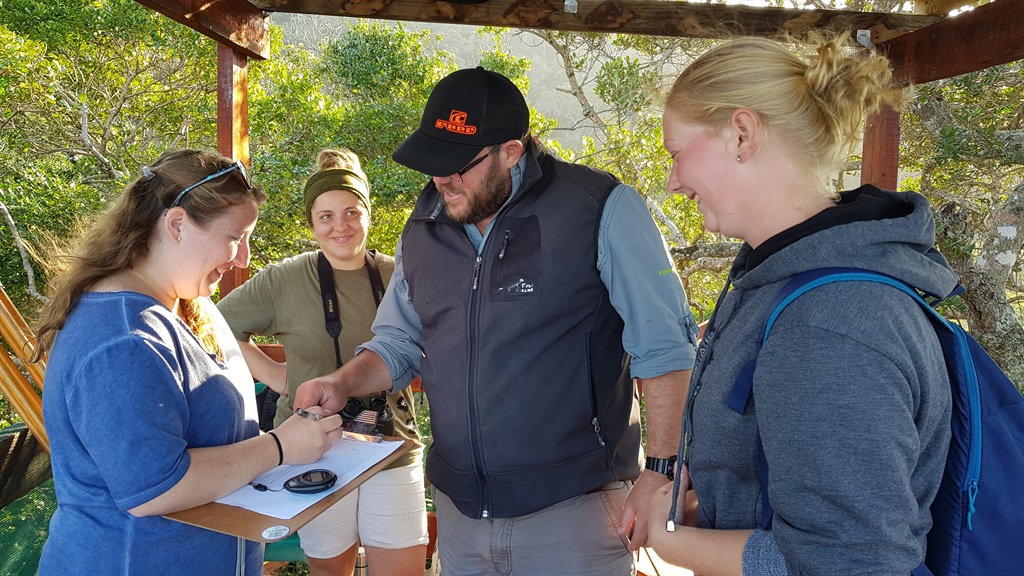
Chris Wilkinson, Technical Manager at the University of Pretoria's Mammal Research Institute, instructs Wildlife ACT volunteers in data collection techniques. (Photo: Love Africa Marketing)
The park's Cape Vidal dunes are hosting the surveyors from conservation NGO Wildlife ACT, offering the perfect vantage point as migrating humpback whales move close to the shore en route between the colder and warmer waters.
“Over the past decade, it has been presumed the humpback whale population is increasing as the number of reported mortalities have increased. However, threats to these whale populations are accelerating,” said Jennifer Olbers, Ezemvelo KZN Wildlife Marine Ecologist.
One of these threats includes noise pollution in the ocean from large ships and offshore mining activities. Whales communicate through a singing-like vocal language and the noise from human activities can overlap with their frequencies and thus cause habitat displacement and changes in behaviour.
"The iSimangaliso coastline offers an important area in which ocean noise from anthropogenic sources is reduced because shipping lanes are further from the coastline and offshore mining is prohibited, making it an ideal location for such a monitoring survey,” concluded Olbers.
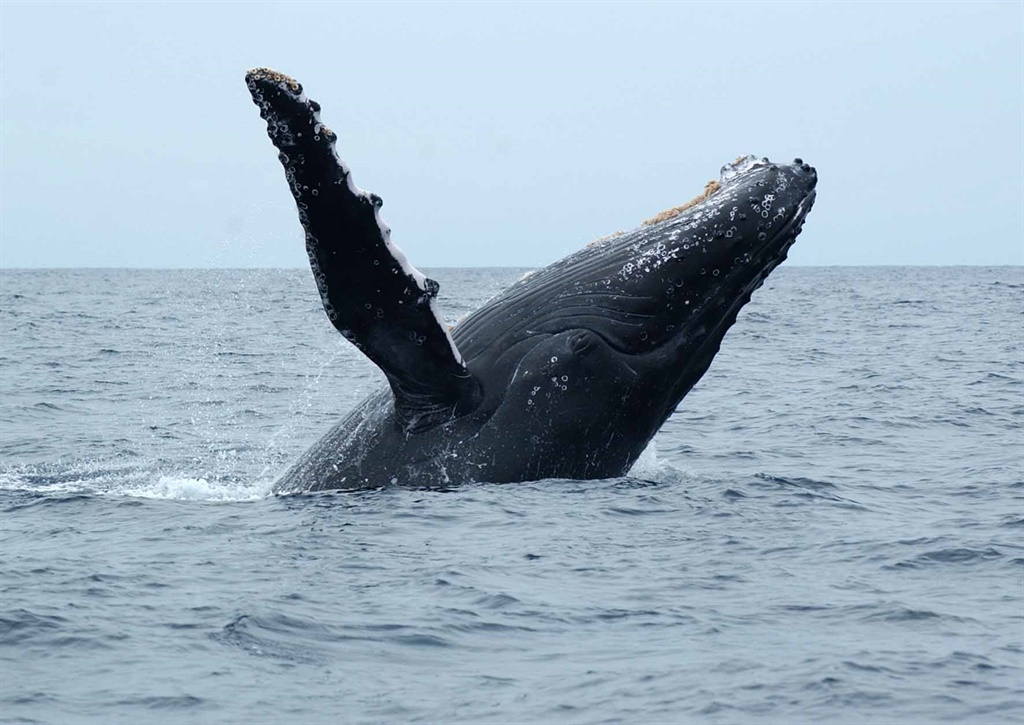
East Coast humpback whale. (Photo: Ken Findlay)
The best spots to see whales in SA
The West Coast
On the Cape West Coast, excellent sightings of southern rights can be enjoyed all the way from Strandfontein to Lambert's Bay, Elands Bay, St Helena Bay, Saldanha Bay and Yzerfontein, just north of Cape Town. Even in the bays of Cape Town southern right whales are frequently spotted. If you’re lucky, you can even see them from the road along the False Bay coast, or on the scenic coastal Victoria Road. If you don’t want to push your luck, book a trip with the experts.
Hermanus and Walker Bay
There is real value behind the now commercial Hermanus whale season. The whales really do come up close to the shore here, and they have a particularly playful attitude towards people it seems.
Mossel Bay
If you’re after the Killers, here might be a good place to look. Hiking the St Blaize Trail will give you a good view of the bay below, where you can spot southern rights, humpbacks, Bryde’s whales or the deadly killer whales feeding on seals on the island in the bay. If you want to go out to sea, book a trip with the boat operators in Plettenberg Bay, further along the Garden Route.
The Wild Coast
From Cape St Francis onwards, the cliff-lined coast gives some of the best vantage points from where to see Humpbacks, Bryde's whales, and further north towards Port St Johns, even sperm whales. Dolphins are also abundant in this area. You can spot them from land, or opt for a whale watching boat ride.
St Lucia
This is humpback whale territory, which stretches as far as Cape Vidal. The whales always stay in the perimeters of the coastline. From mid-May to mid-September, they move more north to breed off the Mozambique coast, and from September to December they return, on route to the nutrient-rich waters of Antarctica.
Eastern Cape
During the months of May to December Humpback whales and Southern Right Whales arrive along the Eastern Cape coast.
One of the best parts of whale watching along the Eastern Cape coast is that you don’t need a boat ride into the ocean to see the whales – they are clearly visible with just a pair of binoculars.
East Coast
Humpbacks, Bryde's whales, and even sperm whales can be spotted along the eastern coastal region of the Wild Coast. With the warm waters reaching this part of the Eastern Cape and KwaZulu-Natal coast, it’s no surprise that dolphins are also regularly seen here too.
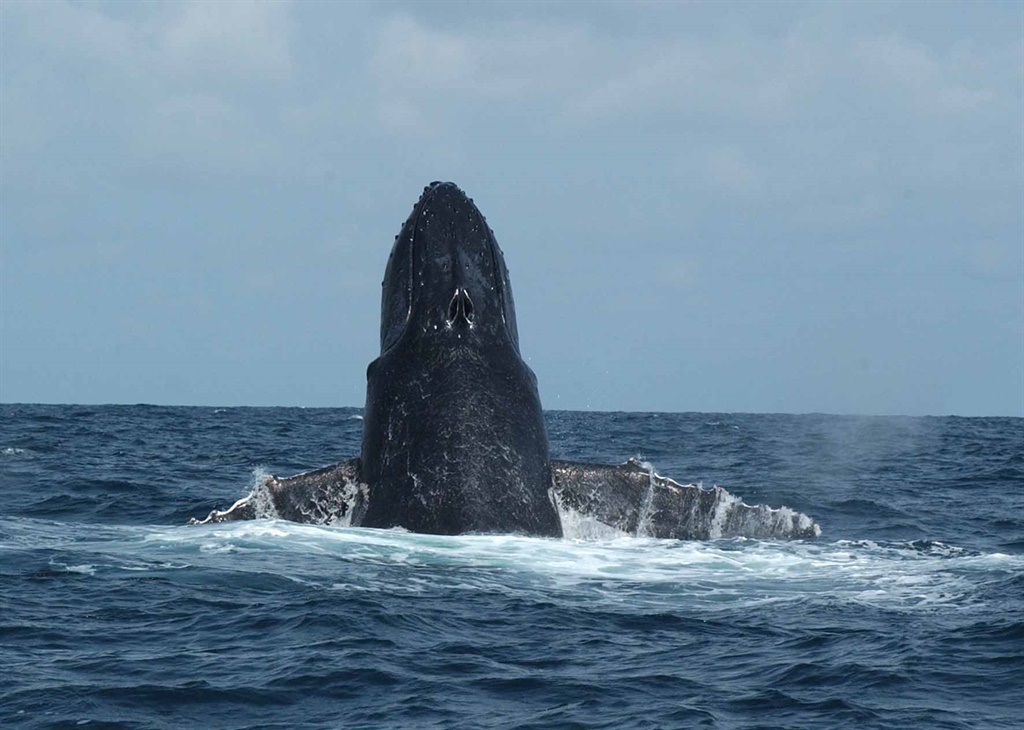
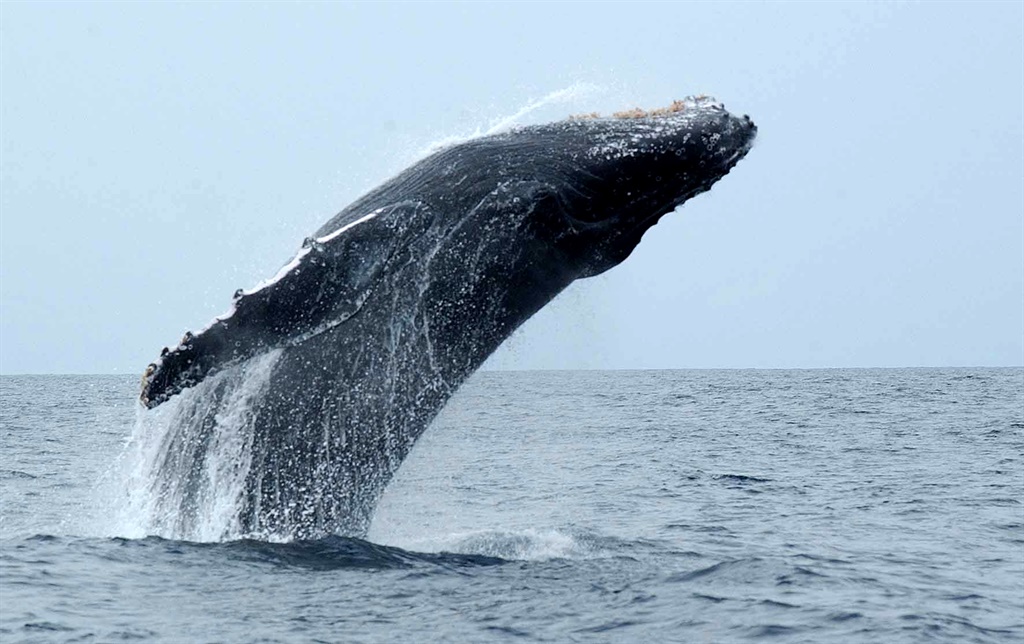
(Photos: Ken Findlay)
2018-07-09 11:44 - Gabi Zietsman
( Watch the videos)
Universities, conservation organisations and other NGOs are banding together for a 2-month monitoring survey of humpback whales that migrate along the KwaZulu-Natal coastline between the Antarctic and Mozambique.
Kicking off in iSimangaliso Wetland Park, the monitoring project forms part of a 30-year survey that is tracking the population recovery of these giants after their numbers were decimated by the coast's commercial whaling practices between 1908 and 1979.
It was first started by Professor Ken Findlay and Dr Peter Best from Cape Peninsula University of Technology and University of Pretoria, respectively, in 1988. The long-term monitoring will not only highlight the impact whaling and its ban had on the species, but how other factors like climate change, whale watching, pollution, fisheries and oil and gas exploration have affected the whales over the decades.
The data collected will include numbers and pod sizes, density, migration speed and their distance from the shore. This data in turn will also create a measuring stick for the southern ocean's wider ecosystem, which can be used to influence policies around conservation and resource use in the area.
"The recovery of Southern Hemisphere humpback whales from severe whaling pressures last century when some 210 000 animals were whaled, must rate as one of the world's great conservation recoveries," commented Findlay.
"Populations that migrate on the KwaZulu-Natal coast each year were whaled in the Antarctic, on their migration and in their Mozambican breeding grounds. Their current recovery at some 10% per annum is really heartening to see."

The whale towers afford observers a panoramic ocean view, ideal for spotting whales. (Photo: Love Africa Marketing)

Chris Wilkinson, Technical Manager at the University of Pretoria's Mammal Research Institute, instructs Wildlife ACT volunteers in data collection techniques. (Photo: Love Africa Marketing)
The park's Cape Vidal dunes are hosting the surveyors from conservation NGO Wildlife ACT, offering the perfect vantage point as migrating humpback whales move close to the shore en route between the colder and warmer waters.
“Over the past decade, it has been presumed the humpback whale population is increasing as the number of reported mortalities have increased. However, threats to these whale populations are accelerating,” said Jennifer Olbers, Ezemvelo KZN Wildlife Marine Ecologist.
One of these threats includes noise pollution in the ocean from large ships and offshore mining activities. Whales communicate through a singing-like vocal language and the noise from human activities can overlap with their frequencies and thus cause habitat displacement and changes in behaviour.
"The iSimangaliso coastline offers an important area in which ocean noise from anthropogenic sources is reduced because shipping lanes are further from the coastline and offshore mining is prohibited, making it an ideal location for such a monitoring survey,” concluded Olbers.

East Coast humpback whale. (Photo: Ken Findlay)
The best spots to see whales in SA
The West Coast
On the Cape West Coast, excellent sightings of southern rights can be enjoyed all the way from Strandfontein to Lambert's Bay, Elands Bay, St Helena Bay, Saldanha Bay and Yzerfontein, just north of Cape Town. Even in the bays of Cape Town southern right whales are frequently spotted. If you’re lucky, you can even see them from the road along the False Bay coast, or on the scenic coastal Victoria Road. If you don’t want to push your luck, book a trip with the experts.
Hermanus and Walker Bay
There is real value behind the now commercial Hermanus whale season. The whales really do come up close to the shore here, and they have a particularly playful attitude towards people it seems.
Mossel Bay
If you’re after the Killers, here might be a good place to look. Hiking the St Blaize Trail will give you a good view of the bay below, where you can spot southern rights, humpbacks, Bryde’s whales or the deadly killer whales feeding on seals on the island in the bay. If you want to go out to sea, book a trip with the boat operators in Plettenberg Bay, further along the Garden Route.
The Wild Coast
From Cape St Francis onwards, the cliff-lined coast gives some of the best vantage points from where to see Humpbacks, Bryde's whales, and further north towards Port St Johns, even sperm whales. Dolphins are also abundant in this area. You can spot them from land, or opt for a whale watching boat ride.
St Lucia
This is humpback whale territory, which stretches as far as Cape Vidal. The whales always stay in the perimeters of the coastline. From mid-May to mid-September, they move more north to breed off the Mozambique coast, and from September to December they return, on route to the nutrient-rich waters of Antarctica.
Eastern Cape
During the months of May to December Humpback whales and Southern Right Whales arrive along the Eastern Cape coast.
One of the best parts of whale watching along the Eastern Cape coast is that you don’t need a boat ride into the ocean to see the whales – they are clearly visible with just a pair of binoculars.
East Coast
Humpbacks, Bryde's whales, and even sperm whales can be spotted along the eastern coastal region of the Wild Coast. With the warm waters reaching this part of the Eastern Cape and KwaZulu-Natal coast, it’s no surprise that dolphins are also regularly seen here too.


(Photos: Ken Findlay)
"Education is the most powerful weapon which you can use to change the world." Nelson Mandela
The desire for equality must never exceed the demands of knowledge
The desire for equality must never exceed the demands of knowledge
- Richprins
- Committee Member
- Posts: 75402
- Joined: Sat May 19, 2012 3:52 pm
- Location: NELSPRUIT
- Contact:
Re: Whales
Good stuff! 
Please check Needs Attention pre-booking: https://africawild-forum.com/viewtopic.php?f=322&t=596
- Richprins
- Committee Member
- Posts: 75402
- Joined: Sat May 19, 2012 3:52 pm
- Location: NELSPRUIT
- Contact:
Re: Whales
Do you think those are the right whales, Harry? 
Please check Needs Attention pre-booking: https://africawild-forum.com/viewtopic.php?f=322&t=596


